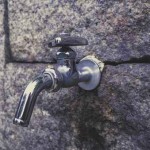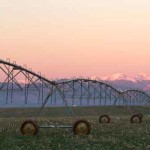
21 Million Gallons of Water Given Back to the Community
When Lee Rain approached Carmen Merlino Jr., President of Oakcrest Farms, in 2011 about implementing Plant-triggered Irrigation methodologies on his Hammonton, NJ blueberry farm, Merlino was initially attracted to the idea mainly as an issue of convenience. Automating irrigation and fertilization in the field furthest from his main facility would save time and effort. For Lee Rain, it was an important opportunity to test and prove its plant-triggered irrigation methodologies could optimize efficiencies and resource use throughout the growing cycle. Continue reading

$9,318.75 More Profit Per Pivot
In 2009, Charles Corey, Farm Director for the Irrigation Research Foundation (IRF) in Yuma, Colorado, came together with a research team from Lee Rain for a multi-year study of precision deficit irrigation in corn production. The principle objectives of the study? To discover if analytical plant-triggered irrigation and monitoring of corn crops can improve present day watering regimes and practices and if so, by how much.
For Lee Rain, the study represented a critical test of the firm’s patented Adviroguard™ software, an agricultural data analysis program designed to identify and guide the implementation of improved operational efficiencies. The conventional amount of irrigation water applied in the Yuma region is estimated to be 22.4 acre inches of water (608,815 gallons of water) per acre or more than 76 million gallons of water per pivot. Using a fully automated irrigation system which employed soil profile analysis to trigger irrigation events to meet the corn plants’ precise needs, the team measured water use efficiencies comparing water applied and consumed to that of yield performance.
The science of plant-triggered irrigation is one of the ways
Lee Rain is empowering growers to succeed and thrive today and tomorrow.
DISCOVERIES
The data from the IRF study provided compelling evidence for the effectiveness of plant-triggered precision irrigation while also revealing some critical deficiencies of traditional irrigation methods. The discovery that the most active root zone in this region is within the top 12 inches of the soil profile indicated that conventional irrigation can force water and nutrients to migrate below the active zone and hinder the plant’s performance. Overwatering can rob the crop of both oxygen and fertilizer. The study demonstrated that plant-triggered irrigation requires significantly less water to grow a corn crop than previously believed—49% less water. An automated plant-triggered irrigation system could effectively identify the critical factors for optimal plant growth: precisely when and how much water to apply.
GROWING FOR TOMORROW
Lee Rain is dedicated to assisting agricultural producers throughout the country in realizing the full potential of their abilities: profitability, sustainability,
manageability, and accountability. To that end, Lee Rain is using innovative analytical tools like Adviroguard™ Analytical Software and discoveries from studies like this one to create Ag Management Strategies, customized action plans that turn data from the field into a clear path to improved performance. The science of plant-controlled irrigation is one of the ways Lee Rain is empowering growers to succeed and thrive today and tomorrow.
OUTCOMES
- MANAGEABILITY. 8.75 acre inches of water saved per year. Compared to the Colorado state average of 22.4 acre inches applied, according to the USDA.
- PROFITABILITY. $9,318.75 more profit per pivot. Based on an improved yield of 21.3 bushels per acre with an average price of $3.50 per bushel and 125 acres irrigated by each pivot.
- ACCOUNTABILITY. 49.7% improved water use efficiency per bushel, representing a savings of 1,602 gallons of water per bushel when compared to Colorado’s state yield and correlating irrigated water applications.
- SUSTAINABILITY. 503 fewer hours of irrigation pumping operation per pivot with a $2,616 savings per pivot. Decreased electrical demand could reduce the statewide electricity demand by over 270 million kilowatt hours for the 10,793 wells serving the state, preventing 354 million pounds of CO2 from entering the atmosphere.

Total Carbon Footprint Reduced by 26,260 lbs
Dr. Gilbert Miller, a horticulturist and researcher at Clemson University’s Edisto Agricultural Research and Extension Center in Blackville, S.C., partnered with the research team from Lee Rain to help solve one of the fundamental challenges facing growers: discovering when to water and how much water should be applied to achieve optimal watermelon yields.
Their research focused on determining the appropriate soil moisture set points for the automation of drip irrigation scheduling in South Carolina’s sandy costal soils. The team installed soil moisture sensors to monitor the water profile of the watermelon crops. More importantly the data gathered from the field would be analyzed utilizing Lee Rain’s own patented Adviroguard™ software with the objective of identifying optimal operational efficiencies for watermelon production.
DISCOVERIES
By monitoring and analyzing the plants’ responses to irrigation with the aid of Adviroguard™, the team was able to obtain a detailed picture of how and when the plants were utilizing water and to precisely adjust water application accordingly. In contrast to two other plots in the trial, the field using this approach consumed 6″ less water (approximately 146,631 gallons/acre). Using the analysis to reduce the number of stress days where the soil was too wet or too dry resulted in a dramatic increase in watermelon yields in successive growing seasons, ranging from 20,000 to 40,000 lbs. more per acre than in plots where standard irrigation practices were applied.
In the 2011 growing season, the difference between standard practice plots and the one using the Adviroguard™ process painted a vivid picture.
Plot 1 Irrigated: 1 time per day
Total Water for Season: 11.5″
Yield: 69,547 lbs. per acre
Plot 2 Irrigated: 3 times per day
Total Water for Season: 11.5″
Yield: 86,593 lbs. per acre
Plot 3 Irrigated:
Only when Adviroguard™ indicated plants required it
Total Water for Season: 6.1″
Yield: 109,884 lbs. per acre
OUTCOMES WITH IMPACT
Findings from studies, like the one at Clemson University, form the foundation of Lee Rain’s Ag Management Strategies—action plans designed to empower growers to realize the full potential of their abilities: manageability, profitability, accountability and sustainability. By using interpreted data gathered directly from above and below the soil surface, Dr. Miller and the Lee Rain team were able to reach some important conclusions regarding how to best deal with the unique challenges of growing watermelons in South Carolina’s sandy soils. When irrigation was in sync with the needs of the plants, there was a profound impact on both water savings and crop yield, a conclusion borne out again and again over five years of study.
Today Lee Rain is partnering with commercial growers across the country to take plant-triggered irrigation beyond the realm of research and put it to work changing the way we grow.
- MANAGEABILITY. 66% improvement in water use efficiency per pound of production (Conventional irrigation = 4.5 gallons of water consumed/lb vs. plant triggered irrigation = 1.5 gallons of water consumed/lb)
- PROFITABILITY. $484,000/100 acres (Increased yield of 40,337 lbs at
$.12/lb = $4,840/acre for each acre of production)
- ACCOUNTABILITY. 14,663,100 gallons of water saved (Using Ag Management
Strategies, 146,631 gallons of water were given back to the community when compared to traditional irrigation for 100 acres of production)
- SUSTAINABILITY. Total carbon footprint reduced by 26,260 lbs of CO2 (Reducing
fuel consumption by 11.83 gallons of diesel fuel per acre reduces the carbon footprint by 26,260 lbs for 100 acres of production)
